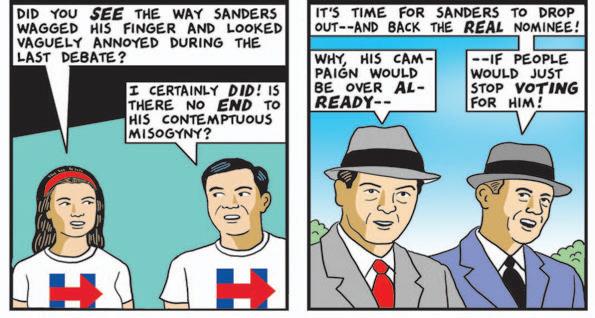
4 minute read
Opinion/Streetalk
from March 17, 2016
This ModeRn WoRld by tom tomorrow

Advertisement
Screwing the average Nevadan How mean were you in high school?
Last week we received a message from something called “DonorsChoose.org”:
“Today, Elon Musk has ‘flash funded’ all of the DonorsChoose.org classroom projects (teacher requests for books, science supplies, field trips, etc.) in Washoe County as part of #BestSchoolDay: a surprise philanthropic flash mob of more than 60 celebrities, business leaders, and athletes who together are bringing to life the classroom dreams of teachers and students across America. Thousands of students and teachers are just finding out this morning!”
Now if only Musk and his fellow cherry-pickers would pay their stinking taxes like local businesses and residents, we wouldn’t need their charity.
There was a time when Nevada was known for restraint in subsidizing businesses. Strict limits were set on credits and other forms of welfare. Today, big corporations are practically lining up at the border waiting for handouts before they will enter, lured here not by quality of life but by all the publicity about the biggest corporate welfare package in human history, granted by Nevada to Tesla—so big that state law had to be amended to allow it.
And that doesn’t take into account the smaller forms of welfare approved in recent years. STAR Bonds have drained school districts of needed funds in order to lure out-of-state chains to Nevada to compete with local merchants who are not subsidized, as in the case of Cabela’s, Scheels and local Mark Fore & Strike Sporting Goods (“Death STAR,” RN&R, April 23, 2009). Little wonder the governor and legislature had to then enact a new tax for schools.
When Tesla doesn’t pay its taxes someone has to. Guess who?
When Tesla brings thousands of workers and their families here and it puts new pressure on local services, guess who pays?
Supposedly subsidizing corporations with tax credits and tax cuts generates a healthy economy. As Pulitzer Prize winning tax reporter David Cay Johnston wrote in these pages in 2011, “The Mad Men who once ran campaigns featuring doctors extolling the health benefits of smoking are now busy marketing the dogma that tax cuts mean broad prosperity, no matter what the facts show” (“Myths and taxes,” RN&R, April 14, 2011).
Johnston has spent a good deal of his career documenting the way that everyday people pay higher taxes when the big boys avoid, shelter, or cheat on their taxes. He devoted an entire book (Perfectly Legal) in 2003 to the way most of us pay taxes owed by a few: “If you make [from] $30,000 to as much as a $1 million, you are literally being taxed so that the super rich, the 28,000 men, women, and children with incomes of more than $8 million per year can pay less.”
This is not prosperity. It is income redistribution toward the top.
If you want to help defend our state against our officials, start with some reading: Hometown Advantage: How to Defend Your Main Street Against Chain Stores and Why it Matters and Big-Box Swindle: The True Cost of Mega-Retailers and the Fight for America’s Independent Businesses, both by Stacy Mitchell. (We recommend ordering them from Sundance Books, not Amazon or Barnes & Noble.) Online, the Institute for Local Self-Reliance is at www.ilsr.org. The Big Box Tool Kit is at https://ilsr.org/big-box-tool-kit/. Ω
Asked at Polo Lounge, 1559 S. Virginia St.
Jack Sosnowski
Retired train engineer I wasn’t. I’ve always been a peacemaker, pretty much my whole life unless you pushed me right down to where I’ve got no choice. I’ve probably said some inappropriate stuff, but basically I’ve always been a peacemaker, always been able to bring people together.
Tim Randolph
Freelance fun haver I was the one they were mean to. That’s my answer. I never did it to other people. Me and my friends were the ones they were mean to, and I graduated from high school here, so, you know.
Vanesa Fenner
Medical staffing manager Well, to my parents? Very mean. To other people, not so mean. I was a very rebellious teenager. I got along with everyone. I still, to this day, don’t have any enemies. As an adult, I had to apologize to my parents.
Trap Schmidt
Project manager I was mean to people mostly following the crowd, and I regret that now—like when I went back to my reunions and stuff. But, you know, there were always those people that didn’t fit in for whatever reason. I don’t know. I’d join in with it and regret it now and try to talk my daughters out of it.
Chuck Bensinger
Retiree I was a very good student and very good person. No, no. I had a lot of friends. How can I say that? We all have our problems, and they had theirs. And I accepted it as that. I don’t know—good, bad or indifferent.








